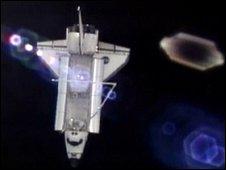Atlantis set for 'final' return
- Published

Atlantis left the station on Sunday
The US shuttle Atlantis and its six crewmen are heading back to Earth, wrapping up the craft's 32nd - and probably final - trip into space.
Atlantis undocked from the upgraded and almost completed International Space Station (ISS) on Sunday, some 354km above the Indian Ocean.
It is set to arrive at the Kennedy Space Centre in Florida at 0848 local time (1248 GMT) on Wednesday.
Only two more shuttle flights remain before the fleet is retired.
Before heading home, the shuttle crew still has to conduct a last inspection of the spacecraft, making sure it wasn't damaged during the mission.
Right before the departure, the ISS astronauts thanked the ship's crew, urging them to "stay safe".
After Atlantis touches down in Florida, it is unlikely to fly again - the White House wants to discontinue the entire shuttle programme.
Atlantis spent a week flying jointly with the station, where it successfully installed a new 8t, 6m-long Russian Mini-Research Module 1 Rassvet (Dawn) packed with 1.5t of Nasa cargo.
The station's astronauts opened the new module on 20 May. Rassvet will be used for cargo storage and as a fourth docking port for the Soyuz and Progress spacecraft's crew and cargo vehicles.
While out on three spacewalks, Atlantis mission specialists Steve Bowen, Michael Good and Garrett Reisman replaced six solar array batteries on the orbiting platform and installed a backup communications Ku-band antenna and a robot tool tray.
Three hours before undocking, the two commanding officers and all 10 members of both crews shook hands and embraced.
"This is the time when we have to say goodbye to our friends, our colleagues, the excellent crew of shuttle Atlantis that did an excellent job performing three EVAs, installing the new Russian module, having good fun, enjoying living on the station and working in space," the ISS Expedition 23 commander Oleg Kotov told Ken Ham, who leads the Atlantis crew.
"Thank you Ken, for an excellent job."
Commander Ham responded: "Well, Oleg, we are one happy shuttle crew, and we are happy because of all of your efforts, too."
Kotov, together with a flight engineer TJ Creamer and Japanese astronaut Soichi Noguchi, are shortly set to follow the Atlantis crew back to Earth after half a year in space. They will head to Kazakhstan's Baikonur Cosmodrome aboard a Soyuz TMA-17 capsule on 1 June.
Safety first
Before testing the re-entry systems on Tuesday and finally piercing the Earth's atmosphere to come back home on Wednesday, Atlantis still has to conduct the ship's last safety inspection.
The astronauts will use a recently repaired inspection boom to make sure there's no micrometeorite damage that might have occurred during the shuttle's time in orbit.
An earlier attempt to conduct a usual post-launch survey failed because of a snagged cable that restricted the motion of Atlantis' sensor system cameras. Mission specialist Stephen Bowen untangled the cord on one of the spacewalks on 19 May.
When Atlantis departed, the ISS was said to be 98% complete in terms of living space.
"This place is now a palace. It's huge, and I've had great fun exploring it," said the shuttle's British-born crew member Piers Sellers.
"We're seeing the station in pretty much its final form, and it's really magnificent."
Atlantis was built in 1984 and together with Discovery and Endeavour remains one of the three Nasa orbiters still in operation. This trip is said to be the spacecraft's final mission.
After 132 voyages, Nasa's orbiter fleet will only go into space twice more before the shuttle programme is discontinued. Discovery's trip is planned for September and Endeavour is set to follow it in November.
US President Barack Obama announced that Nasa should now concentrate on the task of manned missions to new destinations - such as the asteroids and to Mars. And the shuttles, he said, are unable to go this far.
Nasa is currently looking for museums that would like to offer the orbiters a final resting place.
- Published17 May 2010
- Published18 May 2010